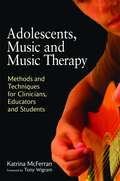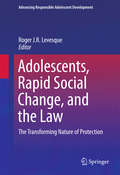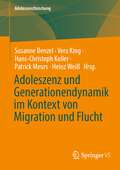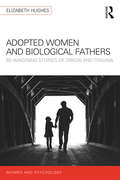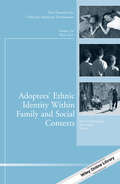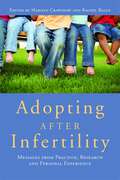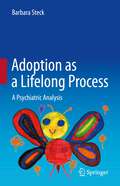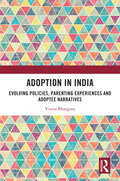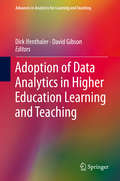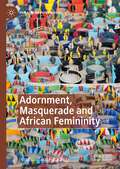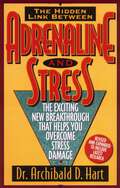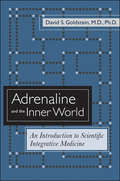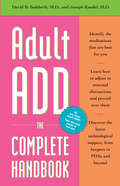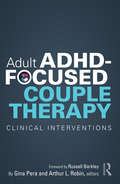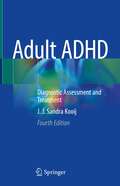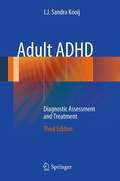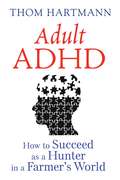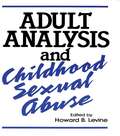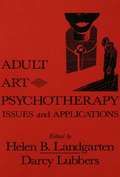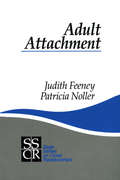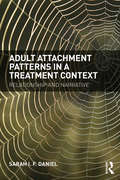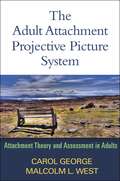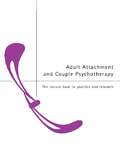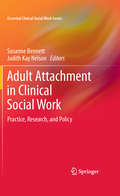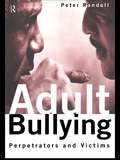- Table View
- List View
Adolescents, Music and Music Therapy
by Katrina McferranWhen guided effectively, the relationship between adolescents and music can offer powerful opportunities for expression and release. This book provides music therapists with the complete 'how to' of working with teenage clients. Helpful and accessible, the book explains the methodology used in music therapy, a topic that has been considered only briefly until now. The author presents an empowering approach to practice, discussing how the therapist can be placed in a collaborative relationship with the individual or with the group. A range of strategies is explored, including song sharing, improvisation, song writing and various multi-media approaches. Some of the key challenges faced by music therapists working with adolescent clients are addressed, including the constantly changing repertoire and evolving musical tastes, and the author offers practical solutions for overcoming these. Contemporary models of Community Music Therapy are outlined in the second half of the book, and case vignettes illustrate how each of the methods can be applied in practice, and the outcomes that may be expected. The first of its kind, this comprehensive book is a must for all music therapists working with adolescent clients.
Adolescents, Rapid Social Change, and the Law: The Transforming Nature of Protection (Advancing Responsible Adolescent Development)
by Roger J.R. LevesqueThis book reviews broad social changes affecting youth development and the inconsistency of the legal system in updating its approach to adolescents' rights. Legal experts examine current adolescent protections and offer research-based proposals for revising laws that underserve or criminalize youth under the rubric of protection. Focusing on the key areas of technology and media, education, and personal relationships, chapters discuss legal responses to a range of challenges impacting young people, including sexual exploitation, the right to privacy, military family issues, and the school-to-prison pipeline. The book's nuanced concept of legal protection credits youth with greater competence than currently afforded, in hope that adolescents can take more ownership of their evolving lives in a rapidly changing society. Topics featured in this text include: How to balance freedom of expression with adolescents' right to data protection. The sexualization of media and its effects on youth attitudes and behaviors. The rising phenomenon of teenage sexting. Protecting students' sexual identity in private schools. Youth sex and labor trafficking and possible solutions to alleviate the widespread crime. Adolescents, Rapid Social Change, and the Law is a must-have resource for researchers and professors, clinicians and related professionals as well as graduate students in developmental psychology, family studies, public health, educational policy and politics, and social policy.
Adoleszenz und Generationendynamik im Kontext von Migration und Flucht (Adoleszenzforschung #11)
by Vera King Susanne Benzel Hans-Christoph Koller Patrick Meurs Heinz WeißDas Buch widmet sich den psychosozialen Folgen von Migration und Flucht für Jugendliche und junge Erwachsene mit Blick auf gesellschaftliche Rahmenbedingungen und psychische Verarbeitungsformen. Adoleszente Generationendynamiken in Familien mit Migrations- oder Fluchtgeschichte werden analysiert im Lichte interdisziplinärer Verknüpfungen von Sozial- und Kulturwissenschaften, psychoanalytischer Sozialpsychologie, erziehungswissenschaftlicher Erforschung von Bildungsbiographien, Kinder- und Jugendpsychologie sowie klinischer Psychoanalyse und Psychosomatik.
Adopted Women and Biological Fathers: Reimagining stories of origin and trauma (Women and Psychology)
by Elizabeth HughesAdopted Women and Biological Fathers offers a critical and deconstructive challenge to the dominant notions of adoptive identity. The author explores adoptive women’s experiences of meeting their biological fathers and reflects on personal narratives to give an authoritative overview of both the field of adoption and the specific history of adoption reunion. This book takes as its focus the narratives of 14 adopted women, as well as the partly fictionalised story of the author and examines their experiences of birth father reunion in an attempt to dissect the ways in which we understand adoptive female subjectivity through a psychosocial lens. Opening a space for thinking about the role of the discursively neglected biological father, this book exposes the enigmatic dimensions of this figure and how telling the relational story of 'reconciliation' might be used to complicate wider categories of subjective completeness, belonging, and truth. This book attempts to subvert the culturally normative unifying system of the mother-child bond, and prompts the reader to think about what the biological father might represent and how his role in relation to adoptive female subjects may be understood. This book will be essential reading for those in critical psychology, gender studies, narrative work, sociology and psychosocial studies, as well as appealing to anyone interested in adoption issues and female subjectivity.
Adoptees' Ethnic Identity Within Family and Social Contexts: New Directions for Child and Adolescent Development, Number 150 (J-B CAD Single Issue Child & Adolescent Development)
by Ellen E. Pinderhughes Rosa RosnatiThis special issue addresses the construction of ethnic identity among international transracial adoptees, which typically involve the placement of Black, Asian, Hispanic, or Multiracial children with White parents. International transracial adoptees, similar to immigrants, navigate a cultural and ethnic context other than their birth culture. However, they are unique in that they navigate these experiences within families who don’t share their cultural, ethnic, and racial background. Critical questions emerge about the construction and development of their ethnic identity. These questions include the role that transracial adoptive parents play in providing cultural socialization (exposure to children’s birth culture); the impact of culture camps designed to provide cultural socialization in the context of peers; the intersection of adoptive identity and ethnic identity and youth adjustment; whether relations between ethnic identity and adjustment are linear or curvilinear; the role of bicultural identity integration as a link between ethnic identity and pscyhosocial adjustment; and ethnic identity processes among internationally transracially adopted young adults who mentor younger adoptees from similar cultures. These questions are addressed in this special issue in a collection of studies that examine ethnic identity among diverse international transracial adoptees, at different ages, adopted into two countries and using differing sample sizes and methodologies.International transracial adoptive families represent a microcosm of the growing international, transracial, and transethnic social transactions taking place in this diverse world. The collective findings in this special issue about the multidimensionality of ethnic identity and its intersectionality with other identities across developmental eras not only enhance knowledge about identity development among international transracial adoptees, but also expand understanding about identity development in general.This is the 150th volume in this Jossey-Bass series New Directions for Child and Adolescent Development. Its mission is to provide scientific and scholarly presentations on cutting edge issues and concepts in this subject area. Each volume focuses on a specific new direction or research topic and is edited by experts from that field.
Adopting After Infertility
by Marilyn Crawshaw Rachel BalenAround three quarters of people who turn to adoption do so because of infertility and those working in this field need information, guidance and support to assist them in the process of adoption to support the adopters and to deal with any issues that may result from infertility. Adopting after Infertility is an accessible and informative interdisciplinary book that addresses the issues that professionals working with adopters and the adopters themselves face when going through the adoption process and the impact of infertility on their experiences. The book includes chapters on the effects of infertility, why people may choose adoption and the assessment and preparation process. It also covers what an Adoption Panel needs to know about the prospective parents, the experiences of those coming to adoption from minority communities or when living with health conditions and post-adoption support needs. Personal accounts by people who have experienced adopting after infertility are included throughout the book. This book will be essential reading for professionals and academics from a range of disciplines including social work, psychology, health, mental health and counselling. It will also be invaluable to students studying for post-qualifying awards.
Adoption as a Lifelong Process: A Psychiatric Analysis
by Barbara SteckThis book addresses the psychosocial complexities of adoption from multiple perspectives, including the biological family, adopted child, and adoptive parents. It highlights the must-have sensitivity and tactfulness for recurring discussions of the adoption situation.Organized into 10 parts, the book begins with a brief outline of the history of adoption and its legal status from antiquity to modern times. Chapters in the first half of the book examine critical topics such as different parenthood situations, stress and pain processes in early childhood, and challenges of domestic, international, transcultural, transracial, foster, and sexual and gender minorities adoption. Within the second half of the book, chapters describe the birth parents' difficulties in relinquishing their infant, the motives of the adoptive parents, and the hardships of the adoptive children in self-development. The final chapters address the topic of deprivation, traumatization, and developmental trauma disorders on a psychodynamic level accompanied by clinical vignettes. Unique, perceptive, and insightful, Adoption, A Life Long Process is an essential resource for all of those involved in the adoption process, including counselors, psychologists, psychiatrists, social workers, adoptive parents, and biological parents.
Adoption in India: Evolving Policies, Parenting Experiences and Adoptee Narratives
by Vinita BhargavaThis book highlights the complexities and multi-dimensionalities of child adoption in India by challenging the prevalent adoption theories. It is the only book to lend a voice to adopted children and adults. It foregrounds the narratives of many families in their experiences of adoption together with the author's personal account as an adoptive parent.The volume outlines parenting practices that lead to success and well-being achieved through adoption. The first unit deals with the 'macro' delineation of child adoption, while the second discusses the 'micro' concerns of parents and children in the Indian context. It also analyses the socio-political and socio-cultural contexts within which adoptions take place. It includes excerpts from the guidelines for in-country adoption, the Juvenile Justice Act and the Hague Convention on inter-country adoptions.This book would be useful to the students, researchers, and faculty of Social Work, Human Development, Education, Psychology, Sociology and Law. It will also be an indispensable companion to adoptive parents (domestic and inter-country), adoptees (domestic and abroad), psychologists, therapists, psychiatrists, and policy makers.
Adoption of Data Analytics in Higher Education Learning and Teaching (Advances in Analytics for Learning and Teaching)
by David Gibson Dirk IfenthalerThe book aims to advance global knowledge and practice in applying data science to transform higher education learning and teaching to improve personalization, access and effectiveness of education for all. Currently, higher education institutions and involved stakeholders can derive multiple benefits from educational data mining and learning analytics by using different data analytics strategies to produce summative, real-time, and predictive or prescriptive insights and recommendations. Educational data mining refers to the process of extracting useful information out of a large collection of complex educational datasets while learning analytics emphasizes insights and responses to real-time learning processes based on educational information from digital learning environments, administrative systems, and social platforms. This volume provides insight into the emerging paradigms, frameworks, methods and processes of managing change to better facilitate organizational transformation toward implementation of educational data mining and learning analytics. It features current research exploring the (a) theoretical foundation and empirical evidence of the adoption of learning analytics, (b) technological infrastructure and staff capabilities required, as well as (c) case studies that describe current practices and experiences in the use of data analytics in higher education.
Adornment, Masquerade and African Femininity (Pan-African Psychologies)
by Ismahan Soukeyna DiopThis book draws on a unique theoretical framework informed by clinical case studies, Fanonian and Lacanian psychoanalysis, and decolonial feminism, to examine the concept of adornment in African cultures. The book discusses the construction of aesthetic feminine ideals and the evolution of such ideals within the history of colonization, decolonization and globalization. Through the analysis of adornments including accessories, hairstyle, clothes and fabric, the author demonstrates how they can reflect social status, and also addresses its symbolic function in rituals. At the level of the individual, it draws on clinical case studies to examine the Lacanian theory of adornment and masquerade of femininity, and the extent to which this echoes ambivalent attitudes towards women in society at large. In doing so it provides a nuanced analysis which reveals how body adornment can be a paradoxical demonstration of both strength and weakness. Building on the author’s previous work in this area, this book offers an important contribution to current debates in psychoanalysis, cultural studies, critical race theory and decolonial feminism.
Adrenaline and Stress: The Exciting New Breakthrough That Helps You OverCome Stress Damage
by Archibald D. HartPsychologist Archibald Hart theorizes that heart attacks and other stress-induced illnesses are the lethal by-products of too much adrenaline pumping through our systems. He suggests ways to minimize these threats through adjustments in values and lifestyles.
Adrenaline and the Inner World: An Introduction to Scientific Integrative Medicine
by David S. GoldsteinThis accessible work is the first in more than seventy-five years to discuss the many roles of adrenaline in regulating the "inner world" of the body. David S. Goldstein, an international authority and award-winning teacher, introduces new concepts concerning the nature of stress and distress across the body's regulatory systems. Discussing how the body's stress systems are coordinated, and how stress, by means of adrenaline, may affect the development, manifestations, and outcomes of chronic diseases, Goldstein challenges researchers and clinicians to use scientific integrative medicine to develop new ways to treat, prevent, and palliate disease. Goldstein explains why a former attorney general with Parkinson disease has a tendency to faint, why young astronauts in excellent physical shape cannot stand up when reexposed to Earth's gravity, why professional football players can collapse and die of heat shock during summer training camp, and why baseball players spit so much. Adrenaline and the Inner World is designed to supplement academic coursework in psychology, psychiatry, endocrinology, cardiology, complementary and alternative medicine, physiology, and biochemistry. It includes an extensive glossary.
Adult ADD, The Complete Handbook: Everything You Need to Know About How to Cope and Live Well with ADD/ADHD
by David Sudderth Joseph KandelImpulsivity, hyperactivity, inattention and distractability—words that ring a bell? For the estimated six million Americans suffering from Attention Deficit Disorder, such words interfere with daily life! For another 40 million people, such words alone make them think they have ADD. A disorder that doesn't go away on its own, ADD turns untreated children into frustrated adults. And, adults who have children with ADD, probably have it as well. From the co-authors of Migraines: What Works! and Back Pain: What Works! (both Prima), comes Adult ADD—The Complete Handbook. Although ADD books have appeared on bestseller lists before, this is the first ADD book ever written by neurologists. In simple and friendly terms, co-authors David Sudderth and Joseph Kandel offer help to those leading frustrating lives. They provide coping mechanisms, both psychological and an up-to-date guide to the latest technology that people with ADD will benefit from.
Adult ADHD-Focused Couple Therapy: Clinical Interventions
by Arthur L. Robin Gina PeraSince ADHD became a well-known condition, decades ago, much of the research and clinical discourse has focused on youth. In recent years, attention has expanded to the realm of adult ADHD and the havoc it can wreak on many aspects of adult life, including driving safety, financial management, education and employment, and interpersonal difficulties. Adult ADHD-Focused Couple Therapy breaks new ground in explaining and suggesting approaches for treating the range of challenges that ADHD can create within a most important and delicate relationship: the intimate couple. With the help of contributors who are experts in their specialties, Pera and Robin provide the clinician with a step-by-step, nuts-and-bolts approach to help couples enhance their relationship and improve domestic cooperation. This comprehensive guide includes psychoeducation, medication guidelines, cognitive interventions, co-parenting techniques, habit change and communication strategies, and ADHD-specific clinical suggestions around sexuality, money, and cyber-addictions. More than twenty detailed case studies provide real-life examples of ways to implement the interventions.
Adult ADHD: Diagnostic Assessment and Treatment
by J. J. KooijThis updated volume provides a clinical based overview of the assessment and treatment of ADHD in adults by a clinical researcher with extensive experience. Its practical focus allows each chapter to answer common questions encountered within clinical practice. Differential diagnosis of ADHD is also discussed in relation to comorbidity with bipolar disorder, borderline personality disorder, chronic fatigue syndrome, and chronic delayed sleep phase. Adult ADHD: Diagnostic Assessment and Treatment, fourth edition aims to help readers identify ADHD effectively and put in place suitable treatments. The book is relevant for psychiatrists, neurologists, and healthcare professionals involved in the diagnosis and treatment of adult ADHD.
Adult ADHD: Diagnostic Assessment and Treatment
by J.J. Sandra KooijAdult ADHD: Diagnostic Assessment and Treatment, Third Edition covers not only diagnostic assessment, but also comorbidity patterns as well as differential diagnosis of ADHD with for example bipolar disorder and borderline personality disorder. The symptom overlap and misdiagnosis of chronic fatigue syndrome in girls and women with the inattentive subtype of ADHD, ADD is explored. The chronic delayed sleep phase syndrome associated with ADHD based on disturbances in the circadian rhythm, and the possible consequences for general health (obesity, diabetes, cardiovascular diseases and cancer) are discussed. There are sections on ADHD and intelligence, criminality, sexuality, dyslexia and autism. Adult ADHD can be treated effectively but as yet the disorder is not always recognised by professionals and this book aims to help correct this. Diagnostic tools are included, such as the structured Diagnostic Interview for Adult ADHD (DIVA), and an ultra-short and somewhat longer screening tool, all based on the DSM-IV criteria for ADHD. Treatment options cover psychoeducation and motivation and individual and group coaching; long-acting stimulants and other new drugs for treating ADHD; use of melatonin to treat the delayed sleep-phase disorder. Useful information is included on the setting up and organisation of a department for adult ADHD with a multidisciplinary team. References, websites and useful international addresses have all been updated. Adult ADHD: Diagnostic Assessment and Treatment, Third Edition is intended for students, junior doctors/residents, psychologists, psychiatrists, other mental healthcare professionals and interested parties and provides a quick overview of the current state of the science and of the methods used in diagnosis and treatment. Adult ADHD: Diagnostic Assessment and Treatment, Third Edition was originally published by Pearson Assessment and Information BV, The Netherlands.
Adult ADHD: How to Succeed as a Hunter in a Farmer’s World
by Thom HartmannHow to harness your ADHD “hunter” strengths to start your own business and prosper in the workplace• Provides organizational strategies, tips to maintain focus, and tools to set goals, build a business plan, and discover the right project to keep you motivated• Shares ADHD success stories from Fortune 500 CEOs, inventors, small business owners, and the author’s own experience in launching new businesses• Explains the positive side of ADHD behavior in the context of creating a business, working within an existing company, and raising children with ADHDMost people do not “grow out” of Attention Deficit Disorder (ADD) or Attention Deficit Hyperactivity Disorder (ADHD). For many, their ADHD traits have led to difficulties in school, relationships, and work. But for our hunter-gatherer ancestors these characteristics were necessary for survival. Hunters must be easily distractible, constantly scanning their environment, and unafraid of taking risks. When humanity experienced the agricultural revolution 10,000 years ago, a vastly different type of personality--the methodical “Farmer”--became dominant. Most of our modern world is tailored to this Farmer personality, from 9-to-5 jobs to the structure of public schools, leaving ADHD Hunters feeling like unsuccessful outcasts. However, the Hunter skill set offers many opportunities for success in today’s Farmer society--if you learn how to embrace your ADHD traits instead of fighting against them.In this step-by-step guide, Thom Hartmann explains the positive side of Hunter behavior. He reveals how Hunters make excellent entrepreneurs, sharing ADHD success stories from Fortune 500 CEOs, inventors, small business owners, and his own hands-on experience in launching new businesses. Drawing on solid scientific and psychological principles, he provides easy-to-follow organizational strategies, tips to maintain focus and create a distraction-free workspace, and tools to set goals, build a business plan, and discover the right business project to keep you motivated. Hartmann shares valuable advice for both the Hunter entrepreneur and the Hunter within an existing company and for curtailing the aggressive side of the Hunter personality in group situations or manager positions. Revealing the many ADHD opportunities hidden within the challenges of work, relationships, and day-to-day life, Hartmann also includes tips on navigating family relationships and parenting--for most Hunter parents are also raising Hunter children.
Adult Analysis and Childhood Sexual Abuse
by Howard B. LevineFollowing a case study approach organized around the psychoanalytic process, this book addresses clinical issues that arise in analytic work with adults who were sexually abused as children. Special emphasis is given to the way in which childhood sexual trauma affects the treatment process and influences the contents and quality of transference. Contributors also focus on the formation of the therapeutic alliance, countertransference issues, and disturbances in ego functions.
Adult Art Psychotherapy: Issues And Applications
by Helen B. Landgarten Darcy LubbersAdult Art Psychotherapy illuminates the range of ever-expanding nature of art therapy as it completes its first two decades of formal existence. The editors suggest that clinical art therapy is capable of adapting to different theories and methods of therapy and that it is equally facile in responding to the diverse problems, opportunities and changes in adult life.
Adult Attachment
by Patricia Noller Dr Judith A. Feeney`It is an excellent volume for attachment researchers at all levels. Researchers and students will find this volume a helpful and generative introduction to adult attachment. The authors set out to increase interest in adult attachment and encourage research in the field. I believe that this coherent, thought-provoking summary of adult attachment research easily accomplishes their goal' - Contemporary Psychology Attachment theory is one of the most popular perspectives currently influencing research in close relationships - and is important in many other fields since the quality of intimate relationships is a key determinant of subjective well-being. This intriguing volume draws together diverse strands of at
Adult Attachment Patterns in a Treatment Context: Relationship and narrative
by Sarah DanielAttachment theory posits that the need for attachment is a life-long phenomenon that becomes especially relevant in times of crisis or trauma. When adults experience illness, accidents, assaults, psychological difficulties or losses, their attachment-behavioural systems are activated, motivating them to seek help and support from family and friends and/or from helping professionals. However, the resulting request for help is affected and shaped by earlier experiences regarding the support and trustworthiness of attachment figures. Can others be trusted? Is it safe to show vulnerability? How should one behave to increase the likelihood of receiving the help needed? Adult Attachment Patterns in a Treatment Context provides an integrated introduction to the subject of adult attachment. Research into adult attachment patterns offers professional helpers a theoretically sound insight into the dynamics underlying a range of client behaviours, including some of the more puzzling and frustrating behaviours such as denying obvious pain or continually pushing the professional for more personal involvement. Sarah Daniel shows how applying knowledge of attachment patterns to treatment settings will improve the way in which professionals engage with clients and the organization of treatments. This book will be relevant to a range of helping professionals such as psychotherapists, psychologists and social workers, both in practice and in training.
Adult Attachment Projective Picture System
by Malcolm L. West Carol GeorgeThis book presents cutting-edge research on adult attachment together with a complete overview of the Adult Attachment Projective Picture System (AAP), the authors' validated developmental assessment. In addition to identifying attachment classification groups, the AAP yields important information about dimensions--including defensive processes not evaluated by other available measures. Detailed case illustrations show what the AAP looks like "in action" and what it reveals about individuals' early experiences, sense of self, and capacity to engage in close, protective relationships. The AAP can be used in clinical or research settings; the concluding chapter discusses promising applications to studying the neurobiology of attachment.
Adult Attachment and Couple Psychotherapy: The 'Secure Base' in Practice and Research
by Christopher ClulowAttachment theory has triggered an explosion of research into family relationships, and has provided a conceptual basis for the work of practitioners. Adult Attachment and Couple Psychotherapy brings research and practice perspectives to bear on the adult couple relationship, and provides a framework for assessing and working with secure and insecure partnerships.Divided into three parts, the book:* looks at what is meant by secure and insecure attachment in the couple* describes how theory and research have been applied to practice, and how practice has added to the understanding of the complex problems that couples bring to therapy* examines the significance of training and the organisation of work for effective practice with couples.Using vivid illustrations from clinical and community work, Adult Attachment and Couple Psychotherapy offers stimulating reading for all those involved in this field who wish to re-assess their models of practice.
Adult Attachment in Clinical Social Work: Practice, Research, and Policy (Essential Clinical Social Work Series)
by Judith Kay Nelson Susanne BennettThe applicability of attachment theory and research to social work and social policy relating to infants and children is well-established. Yet, its usefulness for enhancing the understanding of adults and their needs, both individually and as a group, has been less featured in the attachment literature. Adult Attachment in Clinical Social Work Practice is a wide-ranging look at attachment theory and research, its application to adults, and its natural fit with the social work profession. This edited volume covers the applicability of adult attachment theory to the clinical social work profession's various domains that include human behavior, practice, policy, research, and social work education. It addresses the broad spectrum of clinical social work, including practice in a variety of public and private settings and with a number of diverse populations, including racial-ethnic groups, gays and lesbians, trauma survivors, and child welfare parents. The book highlights the underemphasized contribution of the social work profession to the development of attachment theory and research.
Adult Bullying: Perpetrators and Victims
by Peter RandallThe frequency and severity of personal harrassment is a problem that is only just beginning to be uncovered. In Adult Bullying, psychologist Peter Randall uses the voices of both bullies and victims to reveal the misery that many adults endure. He describes the processes that turn child bullies into adult bullies, often aware of their behaviour but unable to stop it. The workplace and the neighbourhood replace the playground, but the tactics and patterns of reward remain the same. The adult victim has little or no more power than the child counterpart, often changing jobs to escape the attentions of the bully. Similarly, managers like teachers, often fail to tackle the complaints of the victim with the seriousness the problem deserves, preferring to believe that the fuss is unwarranted. Adult Bullying will be welcomed by managers, counsellors, social workers and anyone who has experienced personal harrassment. Effective ways to deal with bullying in the community and the workplace are discussed, with particular attention given to the implications for managers and employees.
